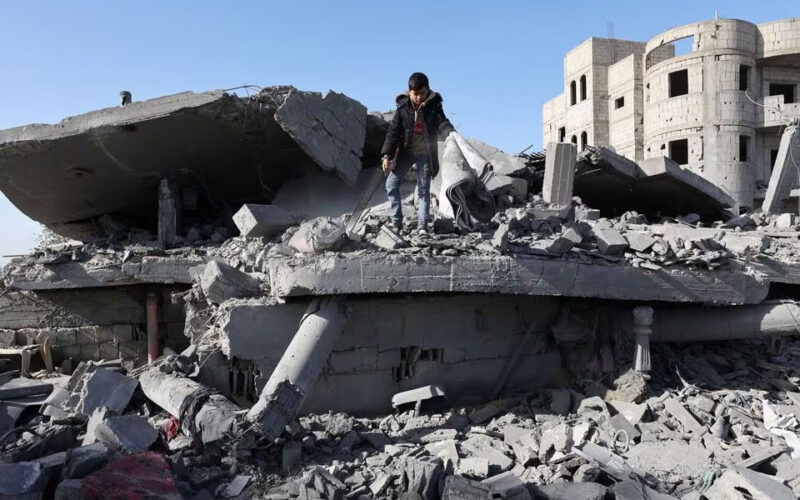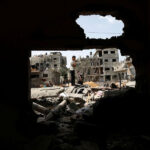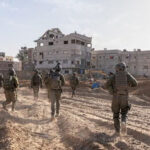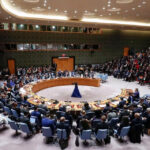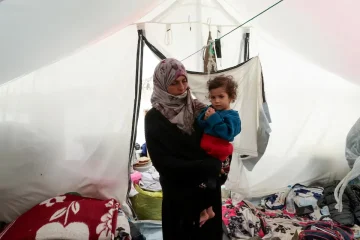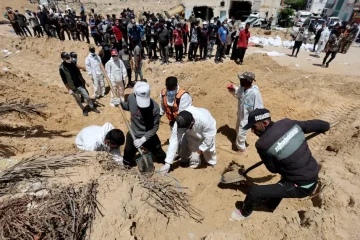ISRAEL battled Hamas militants on Saturday in pursuit of its elusive interim goal of full control of northern Gaza after the U.N. Security Council appealed for more aid for the Palestinian enclave but stopped short of demanding a ceasefire.
Thick smoke hung over the northern town of Jabalia – which is also home to Gaza’s largest refugee camp – and residents reported persistent aerial bombardment and shelling from Israeli tanks, which they said had moved further into the town.
Hamas’ armed wing Al Qassam Brigades said it had destroyed five Israeli tanks in the area, killing and injuring their crews, after reusing two undetonated missiles launched earlier by Israel. Reuters could not independently verify the report.
Israel’s chief military spokesperson said on Friday that its forces had achieved almost complete operational control of northern Gaza and were preparing to expand the ground offensive to other areas in the Strip, with a focus on the south.
The Israeli Defence Forces (IDF) said on Saturday they had fired decoy shots in the area of Issa in Gaza City that lured dozens of militants from a building that served as a Hamas headquarters in the north of the enclave.
“During the joint operational activity, IDF ground and intelligence troops directed an IAF fighter jet to strike the building, eliminating the terrorists,” it said.
The army also released a video it said showed Hamas tunnels in the Issa area. Reuters could not independently verify the location or the date. Israel accuses the militant group of placing tunnels and other military infrastructure among civilians to use them as human shields, something Hamas denies.
Nearly 20,000 Gazans have been confirmed killed during the 11-week conflict, according to the Palestinian health ministry, with thousands more bodies believed trapped under rubble. Almost all of Gaza’s 2.3 million people have been displaced.
Israel says 140 of its soldiers have been killed since it launched its ground incursion on October 20, in response to an October 7 rampage into Israel by Gaza’s ruling Hamas militants, who killed 1,200 people and took 240 hostages back into the enclave.
The official Palestinian news agency WAFA said at least 18 Palestinians were killed and dozens others wounded in an air strike on a house in Nusseirat, central Gaza, late on Friday.
Health officials and Hamas media said separately that an Israeli air strike on a house in the Nusseirat refugee camp killed three people including a journalist from Hamas’ Aqsa TV channel and two relatives.
The reporter’s death brings to at least 69 the number of journalists killed in the conflict, according to a tally by the Committee to Protect Journalists.
The Israeli military has expressed regret for civilian deaths and blames Iran-backed Hamas for operating in densely populated areas, arguing that Israel will never be safe until the group is eliminated.
Sirens warning of possible missile attacks from Gaza rang out across southern Israel on Saturday for the first time in around two days.
‘WHERE SHOULD WE GO?’
Israel has long urged residents to leave northern areas of Gaza but its forces have also been bombarding targets in central and southern parts of the tiny coastal enclave.
“Where should we go to? There is no place safe,” Ziad, a medic and father of six, told Reuters by phone. “They ask people to head to (the central Gaza city of) Deir Al-Balah, where they bomb day and night.”
At least four people, including a girl, were killed in an Israeli air strike on a house in the Al-Bureij refugee camp in the central Gaza Strip, medics said on Saturday.
Separately, Palestinian mourners attended the burial of a family of four killed in an Israeli airstrike on Khan Younis in southern Gaza.
“These people are supposed to be safe in their homes and protected by the law, but… international law has collapsed… If Israel were in the Palestinians’ position, the world would not stand still and would act,” said Ramzy Aidy, a Gaza resident with a doctorate in law.
The conflict has spread beyond Gaza, including into the Red Sea where Yemen’s Iran-aligned Houthi forces have been attacking vessels with missiles and drones in retaliation for Israel’s assault on the enclave, whose Hamas rulers are backed by Iran.
An Israel-affiliated merchant vessel in the Arabian Sea off India’s west coast was struck by an unmanned aerial vehicle, causing a fire, British maritime security firm Ambrey said on Saturday.
An Iranian Revolutionary Guards commander said the Mediterranean Sea could be closed if the United States and its allies continued to commit “crimes” in Gaza, Iranian media reported on Saturday, without explaining how that would happen.
After days of wrangling to avert a threatened U.S. veto, the U.N. Security Council on Friday passed a resolution urging steps to allow “safe, unhindered, and expanded humanitarian access” to Gaza and “conditions for a sustainable cessation” of fighting.
The resolution was toned down from earlier drafts that called for an immediate end to 11 weeks of war and diluting Israeli control over aid deliveries, clearing the way for the vote in which the United States, Israel’s main ally, abstained.
The United States and Israel, which have vowed to eradicate Hamas, oppose a ceasefire, contending it would allow the Islamist militant group to regroup and rearm.
U.S. President Joe Biden’s administration, however, has grown increasingly critical of the mounting casualty toll and humanitarian crisis that has worsened as Israel presses on with its ground and air offensive.
Opinion polls in Israel show continued strong public support for the IDF military operation in Gaza but also to increased doubts about the chances of the remaining hostages held by Hamas – believed to number more than 100 – returning home.

